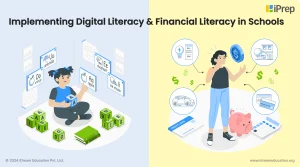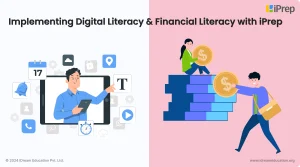Implementing Digital Literacy and Financial Literacy in Schools

Have you ever thought about how much our world has changed in just a few years? Technology is everywhere, and managing money has become a critical skill for navigating life’s opportunities and challenges. In this context, two skills have emerged as essential pillars for students: digital literacy and financial literacy in schools. As we prepare young people for the future, these subjects are not just nice to have—they’re vital. They equip students to make informed decisions, solve problems, and thrive in a world that’s constantly evolving.
Let’s explore why integrating digital literacy and financial literacy in schools’ curriculum is a game-changer and how these skills can set students up for lifelong success. Here’s why these subjects matter, how they lay the groundwork for brighter futures, and how tools like iPrep make these essential skills accessible to students.
The Importance of Digital Literacy
Digital literacy goes beyond mere computer usage; it encompasses a wide range of skills that enable students to confidently and responsibly use digital tools and technologies. With nearly every aspect of modern life intertwined with technology—communication, work, education, and even entertainment—digital literacy has become a fundamental skill for personal and professional success.
In schools, digital literacy ensures that students understand the basics of using devices, the internet, and various applications. It also promotes critical thinking, as students learn to assess the reliability of online information and navigate the digital world safely. In an age of information overload and misinformation, digital literacy helps students become discerning consumers of information, capable of identifying credible sources and avoiding potentially harmful online content. By mastering digital literacy skills, students gain the confidence to use digital platforms creatively and responsibly, opening doors to a multitude of career opportunities in technology-driven fields.
The Role of Financial Literacy In Schools
Alongside digital literacy, financial literacy in schools plays an equally vital role in preparing students for life beyond the classroom. Financial literacy in schools involves understanding basic financial concepts, including budgeting, saving, investing, and managing debt. Teaching financial literacy in schools introduces students to the world of personal finance early on, instilling in them a sense of financial responsibility and independence.
With financial literacy in schools, students can make informed decisions about their finances, avoid debt traps, and work toward financial security. These skills become especially valuable in adulthood when managing expenses, planning for large purchases, or investing for the future. Students who learn about budgeting and saving from a young age are better equipped to make sound financial choices and avoid the pitfalls of poor financial planning. Financial literacy is not just about managing money but about cultivating a mindset that values long-term planning, smart decision-making, and responsible financial habits.
How Digital Literacy and Financial Literacy Secure a Brighter Future
Both digital literacy and financial literacy in schools are essential skills that empower students to take control of their lives. In a rapidly changing job market, digitally literate employees have a clear advantage, as technology skills are highly sought after by employers across industries. From basic proficiency in using digital tools to advanced skills in areas such as coding or data analysis, digital literacy enhances students’ employability and career prospects.
Similarly, financial literacy in schools serves as a safety net for the future. Financially literate students are less likely to encounter issues related to debt, overspending, or financial insecurity. Financially literate individuals understand the importance of saving, investing, and planning for long-term goals, which are key to financial stability and independence. By equipping students with financial literacy skills, schools ensure that they are better prepared to handle life’s financial challenges, whether it’s financing their education, buying a home, or starting a business.
Building Strong Foundations Through School Curriculum
Integrating digital literacy and financial literacy in school curriculum builds a strong foundation for students’ lives. For digital literacy, foundational skills such as operating devices, using productivity tools, and understanding internet safety can be introduced as early as elementary school. As students progress, they can learn more advanced skills like coding, cybersecurity, and digital content creation, which open doors to high-demand careers in technology and beyond.
Similarly, financial literacy should start with basic money management concepts, such as distinguishing between needs and wants or understanding the importance of saving. As students grow, they can move on to topics like budgeting, credit, loans, and investments. This tiered approach enables students to gradually deepen their understanding, applying concepts to real-life situations as they gain more knowledge and experience.
In addition to structured courses, schools can adopt experiential learning methods to make digital literacy and financial literacy engaging. For instance, financial literacy can be taught through budgeting exercises, where students simulate managing expenses within a fixed income. Digital literacy can be reinforced through project-based learning, such as creating digital presentations or coding simple apps, allowing students to apply their skills in meaningful ways.
The Need for Life Skills Education
While digital literacy and financial literacy are crucial for students’ futures, they are part of a broader category of life skills that prepare students for adulthood. Topics like communication, leadership, environmental studies, first aid, performing arts, etc. are indispensable in today’s fast-paced world, enhancing students’ ability to adapt and thrive. In a comprehensive education model, digital literacy and financial literacy work alongside these life skills to provide a holistic learning experience.
Educators and policymakers are increasingly recognizing the importance of life skills education in schools. By integrating digital literacy and financial literacy with other essential life skills, schools can provide students with a well-rounded education that goes beyond academics, preparing them for all facets of life.
Implementing Digital Literacy and Financial Literacy with iPrep

Schools seeking a convenient and comprehensive way to integrate digital literacy and financial literacy into their curriculum can benefit from digital learning platforms like iPrep. Designed to support holistic learning, iPrep offers a wealth of resources that make teaching these essential skills both engaging and accessible.
For digital literacy, iPrep includes interactive videos and notes that teach students how to navigate the digital landscape safely and effectively. Through iPrep’s multimedia content, students can learn practical digital skills while developing the critical thinking abilities necessary for evaluating online information.
When it comes to financial literacy, iPrep offers resources that cover fundamental financial topics, from budgeting basics to understanding investments. These resources are designed to be engaging, with interactive content that explains complex financial concepts in simple terms. iPrep’s financial literacy content equips students with the knowledge they need to make informed financial decisions, setting them up for a secure financial future.
In addition to digital literacy and financial literacy, iPrep provides access to a wide range of other life skills content, together with its unlimited access to engaging learning materials covering all subjects and all grades from classes Nursery to 12th. This includes animated video lessons, practice, tests, notes, syllabus books, activity videos, simulations, and a lot more.
With iPrep, students also get access to competitive exam preparation materials for 50+ competitive exams across India including IIT-JEE, NEET, CLAT, UPSC, NDA, and a lot more. These materials include previous year’s question papers, mock tests, current affairs, and more. These resources help students excel in both school academics as well as exam preparation. With content that ranges from core academics to essential life skills, iPrep serves as a one-stop solution for schools looking to offer students a complete education.
Conclusion
Incorporating digital literacy and financial literacy in schools’ education is a powerful way to prepare students for success in the modern world. These subjects are more than just skills; they are pathways to independence, security, and opportunity. By providing students with the tools they need to navigate technology and manage their finances, schools can empower them to make informed decisions, pursue meaningful careers, and lead fulfilling lives.
With platforms like iPrep, schools have access to a comprehensive resource that supports both digital literacy and financial literacy in schools alongside academic subjects and life skills content. As we prepare the next generation for an increasingly complex world, equipping them with digital literacy and financial literacy in schools is not just beneficial—it’s essential.


